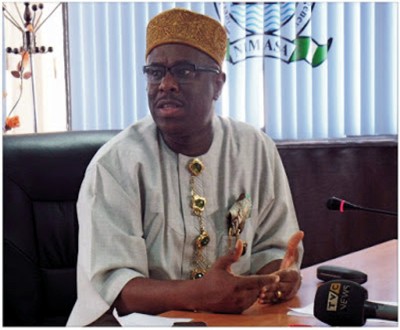Director- General, Nigerian Maritime Administration and Safety Agency (NIMASA), Dr Dakuku Adol Peterside, said the Minister of Transportation, Mr Rotimi Amaechi, has initiated plans to create a national policy on Blue Economy.
Peterside stated this in Lagos on Thursday during an enlightenment workshop organised for directors of Nigerian Shippers’ Council (NSC).
According to him, the national policy on Blue Economy would address issues bordering on aquatics, marine space and all aspects of the nation’s economy as it affects the seas and oceans.
Peterside said that Africa remained underdeveloped in spite of the numerous geographical advantages as well as other natural resources in the region.
He said that the continent’s inability to unlock the inherent potential in the seas and oceans stifled its economic growth over the years.
Peterside said: “There is a relationship between the seas and oceans and wealth creation.
“The problem with Africa is that it still relies on natural resources to a large extent but the top 10 countries in terms of rapid economic growth are actively involved in the blue economy,” the director-general said.
The NIMASA boss said that Africa’s wrong impression about piracy was responsible for the continent’s absence on the list of top shipping nations in the world.
Peterside also noted that climate vulnerability, poor infrastructure, terrorism and legislative vacuum were the challenges militating against development of Africa’s blue economy.
The Blue Economy covers both aquatic and marine spaces including oceans, sea, coasts, lakes, rivers and underground waters.
Peterside said that there is need to create an institutional framework or structure for coordinating the inter-ministerial commission for seabed resources to achieve the potentials of Blue Economy
The NIMASA boss urged Nigerians to exploit opportunities within the Blue Economy.
He said that there should be commitment by African nations toward providing investments to support and improve governance.
“There is need for cooperation between African countries to effectively deal with threats.
” For the Blue Economy to flourish, we need to achieve and maintain peace and security, which are paramount as well as technological innovations to shape the blue economy.
“Protection, conservation, preservation and sustainable use of aquatic biodiversity must be at the center stage
“Harmonised development of the various sectors of the Blue Economy must be prioritised in order to solve existing and potential conflicts within and between sector,” Peterside said.
According to him, 70 per cent of the Earth is covered by water because water is the starting point of life.
He further explained that half of the world’s population lived within 60km of the sea and 75 per cent of all large cities were located along the coast.
The NIMASA boss said that 38 of 54 African nations were coastal and Inland states, while 90 per cent of Africa’s imports and exports were conducted by sea.
He said there were 63 trans-boundary river basins covering 64 per cent of the continent’s land area, providing home to 77 per cent of the region’s population.
The Executive Secretary of Nigerian Shippers’ Council (NSC), Mr Hassan Bello in his address said that NIMASA was critical to several germane regulatory issues such as setting the benchmark for freight rates and implementation of Advanced Cargo Tracking Notes,, among other issues.
Bello said; “We are delighted to host the director l-general of NIMASA.
“I am pleased because NIMASA is a worthy partner in our quest to realise an efficient Nigerian economy.
“The current director- general of NIMASA has turned the agency from what it is used to be to the apex of shipping in Nigeria and we must commend him for that,” he said.
“On the blue economy, Bello said that it was pertinent and instructive to note that shipping was making direct impact on the nation’s economy.
He also called for more collaboration between the Council and NIMASA on the Advanced Cargo Tracking Note l, which the Council is set to implement.
“We have so many issues we would like to work with NIMASA on. We have the issue of the collaboration with them on the modern cargo tracking processes which we want to implement and NIMASA is key to the successful implementation.
“We also have the issue of shipping companies providing holding bays for containers in Apapa which we also want to work with NIMASA”, the executive secretary said.
NAN

